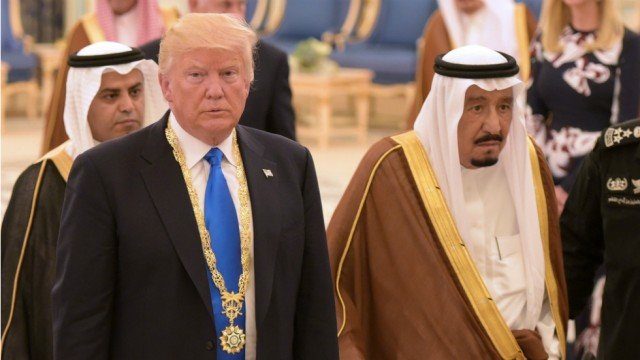Trump trading lives for Saudi money

TEHRAN- Just two days after Donald Trump struck a nearly $110 billion arms deal with Saudi Arabia a suicide bomber, whose ideology was surely driven by Saudi-inspired religious teachings, took the lives of 23 people, including children, in Manchester, Britain. Also, a few days later, on May 26, ISIS targeted buses carrying Coptic Christians in Egypt, killing 29.
However, the United States has been and is continuing to trade human lives with lucrative business deals with Saudi Arabia, a country which according to numerous evidences is ideologically and financially the main engine of extremism and terrorism.
The establishment in Saudi Arabia is being structured in a way that it intrinsically generates violent extremism. Even the “sword dance”, which Trump also took part in Riyadh on May 21, connotes violence by itself.
The fact that sword is a Saudi symbol speaks volumes. Public beheadings of convicts with sword in the Saudi kingdom is the same method practiced by ISIS.
In an article in the Washington Post, published on May 25, foreign-policy specialist Fareed Zakaria said, “Saudi nationals make up the second-largest group of foreign fighters in the Islamic State (the other name for ISIS) and, by some accounts, the largest in the terrorist group’s Iraqi operations.” He also wrote, “The kingdom is in a tacit alliance with al-Qaeda in Yemen.”
In a report posted on the New York Times website on December 6, 2016, former Taliban finance minister Agha Jan Motasim also revealed how he traveled to Saudi Arabia between 2002 and 2007 to raise cash while ostensibly on pilgrimage.
The Saudi inspired extremism, which draws its principles from a Wahhabi interpretation of Islam, inflicted its heaviest terrorist toll on the U.S. on September 11, 2001. Enough to say that 15 of the plotter were citizens of Saudi Arabia.
Wahhabi interpretation of Islam, preached for long years, has been taking hundreds of thousands of lives in Afghanistan and Pakistan long before its flames reached Iraq and Syria and some other countries.
In his speech in Riyadh Trump spoke about the need to “practice tolerance” despite the fact that Saudi Arabia does not allow religious practice by non-Muslims on its land and women are treated like slaves.
In the same speech, Trump accused Tehran of fuelling “terror” without acknowledging that Iran did the greatest service in the war against terrorism by preventing the rapid advances of ISIS in Iraq in 2014.
Trump also accused Iran of fuelling the “fires of sectarian conflict”. However Iran, as an ancient country with rich civilization, has historically been home to different religious groups. Even now it is home to the second largest Jewish community in West Asia. The rights of religious minorities are stipulated in the constitution and they are represented in parliament. Even the country’s president has appointed an advisor for religious and ethnic minorities.
The U.S. has been closing its eyes on Tehran’s war on terrorism just because Iran is strongly opposed to Israel’s illegal annexation of Arab lands. If Iran had not rushed to the support of Iraq, Baghdad would have fallen to the hands of ISIS and all the U.S. gains in Iraq would have gone in the air in a matter of days. In that situation the U.S., which lost 4,886 servicemen and spent over $2 trillion to tame the post-Saddam insurgency, should have started from the beginning and fought with an enemy that this time was much more brutal and more resilient.
Regardless of the fact that the Bush administration made a mistake by invading Iraq, Saudi Arabia, as a country which boasts friendship with Washington, refused to establish political and diplomatic ties with Iraq many years after the downfall of Saddam’s regime. However, Iraq is now one of Iran’s best friends.
Saudi Arabia, through lucrative business deals with the U.S. which in addition to the $110 billion weapons deal included another $250b in commercial investment, cannot whitewash its record in fanning the flames of extremism and terrorism. The U.S. also cannot hide Iran’s war on terrorism.
It is extremely needed that Washington do not sacrifice the lives of citizens both in the U.S. and elsewhere in the world for business deals, especially at a time that ISIS is horrifically pronouncing activities from the Philippines to Indonesia, Afghanistan, Pakistan, Egypt, to Libya and once in a while commit terrorist attacks in European countries.
Though after his return to the White House, Trump, who is a great lover of Saudi petrodollars, proudly boasted in a tweet message that he was bringing back from the Middle East “hundreds of billions of dollars”, his visit did not help promote war against terrorism; on the contrary it made terrorism more deep-rooted and created more enemies for the U.S. among diehard potential terrorists.
In the visit both sides cheated each other but the U.S. was the main loser.
Leave a Comment